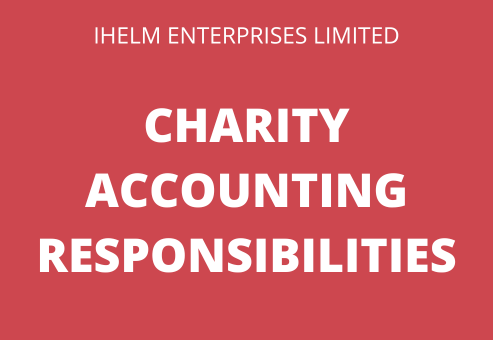During March’s Facebook Live, I talked about the responsibilities that charities in the UK have regarding their accounts.
In the realm of philanthropy, transparency and accountability are paramount. Charities play a vital role in society, addressing various social issues and contributing to the betterment of communities. However, with great power comes great responsibility, particularly when it comes to financial management and reporting. In the UK, charities are subject to stringent regulations to ensure transparency and accountability in their financial practices. In this blog post, we delve into the responsibilities that charities have regarding their accounts in the UK.
1. Compliance with Regulatory Requirements:
Charities in the UK are governed by the Charity Commission, an independent regulator responsible for registering and regulating charities. One of the primary responsibilities of charities is to comply with the regulatory requirements set forth by the Charity Commission. This includes submitting annual financial reports and accounts, which are made available to the public to ensure transparency and accountability.
2. Accurate Financial Reporting:
Charities must maintain accurate and up-to-date financial records that reflect their income, expenditure, assets, and liabilities. Financial reporting should adhere to recognized accounting standards, such as the Statement of Recommended Practice (SORP) for Charities, which provides guidelines for accounting and reporting specific to the charitable sector. Ensuring the accuracy of financial reports is crucial not only for regulatory compliance but also for building trust with donors, beneficiaries, and the public.
3. Proper Use of Funds:
Charities have a fiduciary duty to ensure that funds are used for their intended charitable purposes. This requires prudent financial management and oversight to prevent misuse or misappropriation of funds. Trustees, who are responsible for the governance and management of charities, play a vital role in overseeing the use of funds and ensuring that they are directed towards achieving the charity’s objectives. Transparency regarding the allocation and expenditure of funds is essential for maintaining the trust and confidence of stakeholders.
4. Independent Examination or Audit:
Depending on their size and income, charities in the UK may be required to undergo an independent examination or audit of their accounts. This serves to provide assurance regarding the accuracy and reliability of financial statements. An independent examination involves a review of the charity’s accounts by a qualified examiner, while an audit entails a more comprehensive examination conducted by a registered auditor. The purpose of these reviews is to identify any discrepancies or irregularities and provide recommendations for improvement.
5. Disclosure and Transparency:
Transparency is a cornerstone of effective charity governance. Charities are obligated to disclose relevant financial information to the public, including details of income, expenditure, and key financial policies. This information is typically published in annual reports and accounts, which are accessible to stakeholders via the Charity Commission’s website or the charity’s own website. Additionally, charities must adhere to transparency requirements when soliciting donations or engaging in fundraising activities, providing donors with clear and accurate information about how their contributions will be used.
In summary, charities in the UK have significant responsibilities when it comes to their accounts and financial management. Compliance with regulatory requirements, accurate financial reporting, proper use of funds, independent examination or audit, and transparency are key aspects of fulfilling these responsibilities. By upholding high standards of financial governance and transparency, charities can build trust, demonstrate accountability, and maximize their impact in serving their beneficiaries and fulfilling their charitable missions.
If you have any questions about the responsibilities a charity has regarding their accounts, please feel free to e-mail me.

